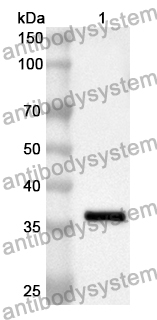Catalog No.
PHH86401
Species reactivity
Human
Host species
Rabbit
Isotype
IgG
Clonality
Polyclonal
Immunogen
E. coli - derived recombinant Human PDCD4/PD4 (Phe164-Tyr469).
Tested applications
ELISA: 1:4000-1:8000, IHC: 1:50-1:100, WB: 1:1000-1:4000
Target
PDCD4, Neoplastic transformation inhibitor protein, Nuclear antigen H731-like, Protein 197/15a, H731, Programmed cell death protein 4
Purification
Purified by antigen affinity column.
Accession
Q53EL6
Applications
ELISA, IHC, WB
Form
Liquid
Storage buffer
0.01M PBS, pH 7.4, 50% Glycerol, 0.05% Proclin 300.
Stability and Storage
Use a manual defrost freezer and avoid repeated freeze thaw cycles. Store at 2 to 8°C for frequent use. Store at -20 to -80°C for twelve months from the date of receipt.
Microglial Pdcd4 deficiency mitigates neuroinflammation-associated depression via facilitating Daxx mediated PPARγ/IL-10 signaling., PMID:38822367
An integrated proteome and transcriptome of B cell maturation defines poised activation states of transitional and mature B cells., PMID:37612319
B-cell receptor signaling induces proteasomal degradation of PDCD4 via MEK1/2 and mTORC1 in malignant B cells., PMID:35306137
Anti-PD-L1 Antibody Enhances T Cell Immune Responses and Reduces Resistance of Breast Cancer Cells to Radiotherapy., PMID:35295718
Targeted inhibition of eIF4A suppresses B-cell receptor-induced translation and expression of MYC and MCL1 in chronic lymphocytic leukemia cells., PMID:34398253
MicroRNA-183-5p is stress-inducible and protects neurons against cell death in amyotrophic lateral sclerosis., PMID:32558113
Degradation of the Tumor Suppressor PDCD4 Is Impaired by the Suppression of p62/SQSTM1 and Autophagy., PMID:31952347
Activation of miR-21-Regulated Pathways in Immune Aging Selects against Signatures Characteristic of Memory T Cells., PMID:30463012
Suppressors for Human Epidermal Growth Factor Receptor 2/4 (HER2/4): A New Family of Anti-Toxoplasmic Agents in ARPE-19 Cells., PMID:29103264
CTLA-4-mediated posttranslational modifications direct cytotoxic T-lymphocyte differentiation., PMID:28644433
Identification of a TLR2-regulated gene signature associated with tumor cell growth in gastric cancer., PMID:28481875
Co-delivery of microRNA-21 antisense oligonucleotides and gemcitabine using nanomedicine for pancreatic cancer therapy., PMID:28444967
Developing anti-neoplastic biotherapeutics against eIF4F., PMID:28004147
Engagement of the B-cell receptor of chronic lymphocytic leukemia cells drives global and MYC-specific mRNA translation., PMID:26491071
MicroRNA-21 links epithelial-to-mesenchymal transition and inflammatory signals to confer resistance to neoadjuvant trastuzumab and chemotherapy in HER2-positive breast cancer patients., PMID:26452030
Deficiency of programmed cell death 4 results in increased IL-10 expression by macrophages and thereby attenuates atherosclerosis in hyperlipidemic mice., PMID:26166769
Inhibiting CARD11 translation during BCR activation by targeting the eIF4A RNA helicase., PMID:25320244
Epstein-Barr Virus_Encoded LMP1 upregulates microRNA-21 to promote the resistance of nasopharyngeal carcinoma cells to cisplatin-induced Apoptosis by suppressing PDCD4 and Fas-L., PMID:24194922
AC1MMYR2, an inhibitor of dicer-mediated biogenesis of Oncomir miR-21, reverses epithelial-mesenchymal transition and suppresses tumor growth and progression., PMID:23811941
A polymorphism affecting MYB binding within the promoter of the PDCD4 gene is associated with severe asthma in children., PMID:23606399
[The expression of PD4 and its significance in human laryngeal carcinoma]., PMID:21809556
Pdcd4 expression in intraductal papillary mucinous neoplasm of the pancreas: its association with tumor progression and proliferation., PMID:20656320
Micro-RNA-21 regulates TGF-β-induced myofibroblast differentiation by targeting PDCD4 in tumor-stroma interaction., PMID:20533548
Hyaluronan-CD44 interaction with protein kinase C(epsilon) promotes oncogenic signaling by the stem cell marker Nanog and the Production of microRNA-21, leading to down-regulation of the tumor suppressor protein PDCD4, anti-apoptosis, and chemotherapy resistance in breast tumor cells., PMID:19633292
Development of LanthaScreen cellular assays for key components within the PI3K/AKT/mTOR pathway., PMID:19196698
[Expression of PD4, CD44v6, CD44v9 and its clinical significance in human laryngeal carcinoma]., PMID:18476625
Alterations in the expression of PDCD4 in ductal carcinoma of the breast., PMID:17982621
Programmed cell death-4 tumor suppressor protein contributes to retinoic acid-induced terminal granulocytic differentiation of human myeloid leukemia cells., PMID:17259349
Novel human PDCD4 (H731) gene expressed in proliferative cells is expressed in the small duct epithelial cells of the breast as revealed by an anti-H731 antibody., PMID:10632927

